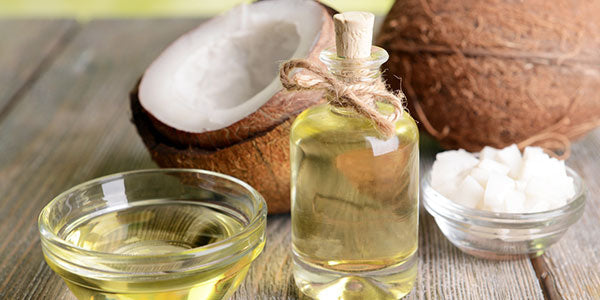
More than just an ingredient to make sunscreen smell delicious these days, coconut oil has taken center stage in the health world. With individuals all over the planet beginning to use coconut oil in new and surprising ways, science has also started to carefully inspect coconut oil - and more importantly the molecules found within coconut oil - for new and surprising health benefits.
The type of coconut oil that is most researched is virgin coconut oil, collected from the drupes of the coconut tree, or Cocos nucifera. Processed or refined coconut oils-which have usually been stripped of some naturally occurring ingredients-do not appear to possess the same sorts of health benefits as the virgin coconut oil.
Don't be fooled by that ‘extra' in front of extra virgin coconut oil - as there are no specific preparation methods for achieving the ‘extra' status. Virgin or extra virgin coconut oil are equivalent in most countries.
Coconut Oil for Your Brain
Recently science has shown that consuming virgin coconut oil provides anti-stress and antioxidant effects to living cells.
In one study, animals who were given coconut oil exhibited higher levels of brain antioxidants following stress. These higher levels of antioxidants allow the brain cells to recover and repair themselves, and help reduce the effects of stress on neurons within the brain. The animals also appeared to cope with stress better, and had lower weights of adrenal glands - which are the glands that produce the stress hormone, cortisol.
Virgin coconut oil can probably help your body cope with stress better, and more than that, it can also help keep your heart healthy.
Coconut Oil for Your Heart and Blood Vessels
Coconut oil is rich in medium-chain fatty acids - which are a special kind of fat that bypass the body's normal absorption routes. This does not mean that they are stored more easily as fat - it means they enter the bloodstream more quickly to be burned for energy. Medium chain fatty acids like those found in coconut oil are the perfect length and shape to pass directly into the bloodstream, to be used up to create for energy by brain cells and body cells alike.
Coconut oil contains a large portion of these medium chain fatty acids - specifically lauric acid, caproic acid, caprylic acid, and capric acid. Coconut oil is also rich in gallic acid, which is phenol compound that serves a potent, powerful antioxidant for living things.
These polyphenolic compounds-like gallic acid-are also resonsible for the anti-inflammatory effect of virgin coconut oil, which helps prevent cardiovascular disease by reducing the progression of atherosclerosis - or damage to your blood vessels. Coconut oil can help reduce inflammation by helping reduce the amount of LDL that becomes oxidized - or rancid. Oxidation of LDL cholesterol -- which is one of the first steps in the formation of plaque in the arteries -- can lead to the development of atherosclerosis, or cardiovasuclar disease.
Oxidized LDL cholesterol increases inflammation within blood vessels, and can also lead to the progression of cardiovascular disease. In addtion to anti-inflammatory effects, virgin coconut oil has also been linked to reducing the liklihood of developing a blood clot, because it helps to reduce the coagulation (or stickiness) of platlets in the blood which could lead to a blood clot.
Coconut Oil and Your Blood Pressure
Virgin coconut oil consumption can result in a lower blood pressure and increased nitric oxide levels. While coconut oil does not seem to relax blood vessels, it can serve to reduce vasoconstriction, or the tightenening of blood vessels that make them inflexible, or stiff.
Coconut Oil on Your Skin
As a skin lubricant, it's important to remember that all oils in general (not just coconut oil) can do this - imagine slathering butter all over your skin. The end result would be essentially the same if you used butter instead of coconut oil - it just might not smell quite as good.
However, as mentioned earlier, virgin coconut oil is rich in polyphenols and medium-chain fatty acids, making it largely different from the composition of butter. In fact, most of the saturated fats in coconut are medium chain saturated fatty acids whose properties and metabolism are quite different when compared to saturated fatty acids in animal foods. Medium chain saturated fatty acids do not undergo degradation and re-esterification processes (which can raise cholesterol levels in the blood) and are readily used in the body to create energy. This makes coconut superior to butter when it comes to health benefits.
References:
Amarasiri WA, Dissanayake AS. Coconut fats. Ceylon Med J. 2006 Jun;51(2):47-51.
Yeap SK, Beh BK, Ali NM, Yusof HM, Ho WY, Koh SP, Alitheen NB, Long K. Antistress and antioxidant effects of virgin coconut oil in vivo. Exp Ther Med. 2015 Jan;9(1):39-42. Epub 2014 Nov 3.
Nevin KG, Rajamohan T. Influence of virgin coconut oil on blood coagulation factors, lipid levels, and LDL oxidation in cholesterol-fed Sprague-Dawley rats. e-SPEN; 2008;3:e1-e8.
Babu AS, Veluswamy SK, Arena R, Guazzi M, Lavie CJ. Virgin coconut oil and its potential cardioprotective effects. Postgrad Med. 2014 Nov;126(7):76-83. doi: 10.3810/pgm.2014.11.2835.







